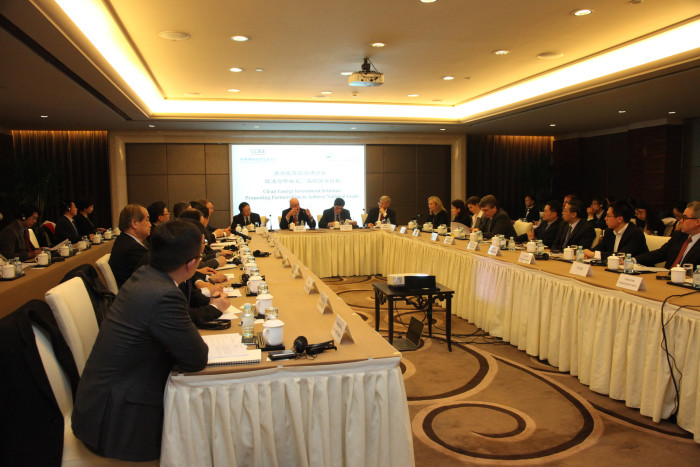
The Paulson Institute and the Chinese Center for International Economic Exchanges (CCIEE) co-hosted a seminar to discuss clean energy investment in the United States and China.
The challenge: How can business and government work together to support the goals that Presidents Barack Obama and Xi Jinping set forth in the US-China joint agreement on climate change in November 2014? Obama targeted CO2 reductions of 26%-28% by 2025, while Xi committed China for the first time to cap its CO2 emissions by 2030, pledging to reach that peak sooner, if possible. The Chinese president further committed to obtain 20% of China’s power from clean sources by 2030.
At the event, senior business leaders, current and former U.S. Department of Energy representatives and investment fund managers explored how to unleash the technologies that will help both countries achieve their goals. They agreed that private capital, companies, laboratories, foundations, university-based researchers, NGOs and others all have a role to play in the process, and that government can act as an enabler, a regulator, a catalyst and at times, a customer.
Institute Chairman Hank Paulson began the day by stressing the importance of clean technologies to solving some of China’s most pressing environmental challenges: “We all know that the ultimate solution to air quality is the development and deployment of green technologies on a commercial scale,” he said. “There are issues around intellectual property, but there is no reason that our two countries shouldn’t get together to figure them out as well as to fund these projects.”
The seminar, held at China’s State Grid offices in Beijing, drew on lessons from the U.S. Department of Energy’s work and broader U.S. experiences in developing clean technology markets, and explored opportunities for bilateral cooperation in this area.
Paulson Institute Distinguished Fellow Daniel Poneman, former Deputy Secretary of Energy, outlined some potential solutions in a paper he presented as a starting point for the discussion. Among his ideas: create a new US-China fund to target investment in existing technologies that are struggling to get to commercial production; use tax policies to create the right incentives around clean technologies; and de-risk clean energy lending by offering more loan guarantees.
In addition to these topics, participants discussed practical ways to encourage more energy efficiency, increase public-private partnerships and expand and improve carbon trading schemes in China.
One expert at the seminar estimated that at least two trillion RMB (US$323 billion) is needed to support green tech development every year over the next five years in order to reach China’s sustainability goals. But China’s fiscal system can only provide 10%-15% of the total.
The Paulson Institute and CCIEE are working together with business and government to identify practical ways to fill that gap.





